1. Park HJ, Heo JY, Kim YH, Song HJ. Development and effects of a combined program of cognitive enhancement - social skills - parents training program for ADHD children and their parents. J Emot Behav Disord. 2011; 27(3):25–58.
2. Biederman J, Kwon A, Aleardi M, Chouinard VA, Marino T, Cole H, et al. Absence of gender effects on attention deficit hyperactivity disorder: Findings in nonreferred subjects. Am J Psychiatry. 2005; 162(6):1083–1089. DOI:
10.1176/appi.ajp.162.6.1083.
4. Kim IH. Effect of the group art therapy in children with attention-deficit hyperactivity disorder (ADHD). J Korean Acad Psychiatr Ment Health Nurs. 2006; 15(2):152–160.
5. Oh WO, Park ES. Parenting experiences of parents of children with ADHD: Approaching the normal. J Korean Acad Nurs. 2007; 37(1):91–104.
6. Kim IH. The effect of social skills training with attention-deficit hyperactivity disorder (ADHD). J Korean Acad Psychiatr Ment Health Nurs. 2007; 16(4):420–428.
7. Lee DH, Kim MS, Song YJ, Kwon BM. An exploratory review of literature on peer relationship of children with ADHD. Korean J Couns Psychother. 2013; 25(3):643–672.
8. Park SH, Go H. A case study applying both cognitive behavioral therapy and art psychotherapy to an ADHD child. J Arts Psychother. 2010; 6(2):79–99.
9. Seo JY, Park WJ. The meta analysis of trends and the effects of nonpharmacological intervention for school aged ADHD children. J Korean Acad Psychiatr Ment Health Nurs. 2010; 19(2):117–132.
10. Kim Y, Seo S. Current trends and issues in non-medication interventions to address the academic impairment of children and adolescents with ADHD. Korean J Sch Psychol. 2011; 8(1):79–110.
11. Song CJ, Koo BH, Bai DS. Item selection and analysis for the development of Korean attention deficit hyperactivity disorder rating scale. J Emot Behav Disord. 2006; 22(1):1–26.
12. Higgins JPT, Green S, editors. Cochrane handbook for systematic reviews of interventions version 5.1.0 [Internet]. London, UK: The Cochrane Collaboration;2011. cited 2011 March 20. Available from:
http://handbook.cochrane.org/.
13. Cully JA, Teten AL. A therapist's guide to brief cognitive behavioral therapy. Houston, TX: South Central Mental Illness Research, Education, and Clinical Center;2008.
15. Borenstein M, Hedges LV, Higgins JPT, Rothstein HR. Introduction to meta-analysis. West Sussex, UK: John Wiley & Sons, Ltd.;2009.
16. Cohen J. Statistical power analysis for the behavioral sciences. 2nd ed. Hillsdale, NJ: Lawrence Erlbaum Associates;1988.
17. Rosenthal R, Rubin DB. A simple, general purpose display of magnitude of experimental effect. J Educ Psychol. 1982; 74(2):166–169.
18. Littell JH, Corcoran J, Pillai V. Systematic reviews and meta-analysis. New York, NY: Oxford University Press;2008.
19. Egger M, Smith GD, Schneider M, Minder C. Bias in meta-analysis detected by a simple, graphical test. BMJ. 1997; 315(7109):629–634.
20. Duval S, Tweedie R. A nonparametric "trim and fill" method of accounting for publication bias in meta-analysis. J Am Stat Assoc. 2000; 95(449):89–98. DOI:
10.1080/01621459.2000.10473905.
21. Miranda A, Presentación MJ, Soriano M. Effectiveness of a school-based multicomponent program for the treatment of children with ADHD. J Learn Disabil. 2002; 35(6):546–562.
22. Kang SH, Hong JM, Baek YH. The effect of group art activity program on impulsiveness and self-control of children with attention deficit hyperactivity. Korean J Art Ther. 2006; 13(1):23–48.
23. Lee Y. A meta-analysis of the effect of group counseling programs on ADHD children's behavior change [master's thesis]. Cheongju: Korea National University of Education;2006.
24. Van der Oord S, Prins PJ, Oosterlaan J, Emmelkamp PM. Efficacy of methylphenidate, psychosocial treatments and their combination in school-aged children with ADHD: A meta-analysis. Clin Psychol Rev. 2008; 28(5):783–800. DOI:
10.1016/j.cpr.2007.10.007.
25. Ghafoori B, Tracz SM. Effectiveness of cognitive-behavioral therapy in reducing classroom disruptive behaviors: A meta-analysis. Washington, DC: Education Resources Information Center;2001. Report No.: ERIC Document Reproduction Service No. ED 457182.
26. Toplak ME, Connors L, Shuster J, Knezevic B, Parks S. Review of cognitive, cognitive-behavioral, and neural-based interventions for attention-deficit/hyperactivity disorder (ADHD). Clin Psychol Rev. 2008; 28(5):801–823. DOI:
10.1016/j.cpr.2007.10.008.
27. Fabiano GA, Pelham WE Jr, Coles EK, Gnagy EM, Chronis-Tuscano A, O'Connor BC. A meta-analysis of behavioral treatments for attention-deficit/hyperactivity disorder. Clin Psychol Rev. 2009; 29(2):129–140. DOI:
10.1016/j.cpr.2008.11.001.
28. Kim JU, Cheon SM, Hwang HJ. A comparison of the effect of cognitive/behavioral NLP group counseling on behavior and school life adjustment of ADHD children. Korean J Couns. 2005; 6(3):777–788.
29. Sohn JN. The effects of the peer suicide prevention gatekeeper program for middle school students. J Korean Acad Psychiatr Ment Health Nurs. 2011; 20(1):111–119.
30. Curtis DF, Pisecco S, Hamilton RJ, Moore DW. Teacher perceptions of classroom interventions for children with ADHD: A cross-cultural comparison of teachers in the United States and New Zealand. Sch Psychol Q. 2006; 21(2):171–196.

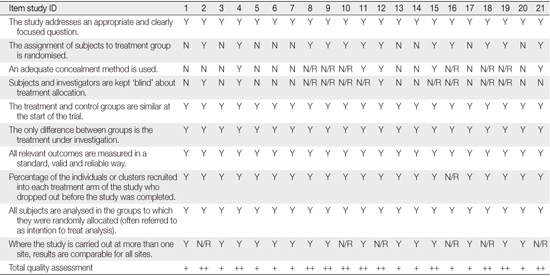




 PDF
PDF ePub
ePub Citation
Citation Print
Print


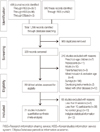
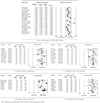
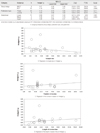

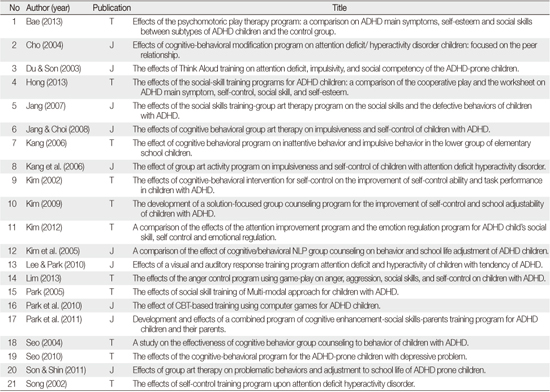
 XML Download
XML Download